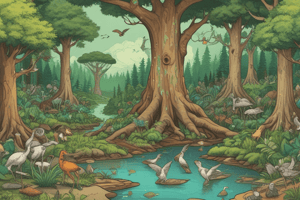Podcast
Questions and Answers
Social skills are only important for personal goals.
Social skills are only important for personal goals.
False (B)
Empathy is the ability to manage and resolve disagreements in a constructive manner.
Empathy is the ability to manage and resolve disagreements in a constructive manner.
False (B)
Emotional wellbeing refers to the ability to recognize and manage one's emotions.
Emotional wellbeing refers to the ability to recognize and manage one's emotions.
True (A)
Coping skills are only important for dealing with anxiety.
Coping skills are only important for dealing with anxiety.
Trust is a key aspect of unhealthy relationships.
Trust is a key aspect of unhealthy relationships.
Nonverbal communication is not important in social interactions.
Nonverbal communication is not important in social interactions.
Resilience is the ability to recognize and understand one's emotions.
Resilience is the ability to recognize and understand one's emotions.
Active listening is only important in personal relationships.
Active listening is only important in personal relationships.
Self-esteem is not a component of emotional wellbeing.
Self-esteem is not a component of emotional wellbeing.
Verbal communication is the only way to express oneself effectively.
Verbal communication is the only way to express oneself effectively.
Flashcards are hidden until you start studying
Study Notes
Conservation
- Goals:
- Preserve and protect natural resources for future generations
- Maintain biodiversity and ecological integrity
- Promote sustainable development
- Strategies:
- Habitat preservation and restoration
- Species conservation (endangered species, invasive species management)
- Sustainable resource management (forestry, fishing, mining)
- Community engagement and education
- Policy and legislation development
Ecology
- Definition: Study of interactions between organisms and their environment
- Key Concepts:
- Ecosystems: communities of living and non-living components (biotic and abiotic factors)
- Energy flow: producers, consumers, decomposers
- Nutrient cycling: water, carbon, nitrogen, oxygen
- Population dynamics: growth, decline, migration
- Community ecology: species interactions, competition, predation
Biomes
- Definition: Large, naturally occurring communities of flora and fauna occupying a major habitat
- Types:
- Terrestrial Biomes:
- Desert
- Grassland
- Tropical rainforest
- Temperate rainforest
- Temperate deciduous forest
- Boreal forest (taiga)
- Freshwater Biomes:
- Rivers
- Lakes
- Wetlands
- Marine Biomes:
- Coral reefs
- Estuaries
- Open ocean
- Deep-sea trenches
- Terrestrial Biomes:
- Characteristics:
- Climate, vegetation, soil, and fauna vary among biomes
- Biomes are not strictly defined and can blend together
- Human activities can alter biomes (deforestation, pollution, climate change)
Conservation
- Conservation aims to preserve and protect natural resources for future generations while promoting sustainable development and maintaining biodiversity and ecological integrity.
Ecology
- Ecology is the study of interactions between organisms and their environment, encompassing biotic and abiotic factors.
- Ecosystems consist of communities of living and non-living components, with energy flowing through producers, consumers, and decomposers.
- Nutrient cycling involves the circulation of essential elements like water, carbon, nitrogen, and oxygen.
- Population dynamics involve growth, decline, migration, and other changes in populations over time.
- Community ecology examines species interactions, including competition and predation.
Biomes
- Biomes are large, naturally occurring communities of flora and fauna occupying a major habitat, characterized by distinct climate, vegetation, soil, and fauna.
- Terrestrial biomes include deserts, grasslands, tropical rainforests, temperate rainforests, temperate deciduous forests, and boreal forests (taiga).
- Freshwater biomes comprise rivers, lakes, and wetlands.
- Marine biomes encompass coral reefs, estuaries, open ocean, and deep-sea trenches.
- Biomes are not strictly defined and can blend together, with human activities capable of altering them through deforestation, pollution, and climate change.
Social Skills
- Social skills are crucial for building and maintaining relationships, achieving personal and professional goals, and overall mental health and wellbeing.
- Key social skills include:
- Verbal communication, which involves expressing oneself clearly and effectively through spoken language.
- Nonverbal communication, which involves conveying meaning through body language, facial expressions, and tone of voice.
- Active listening, which involves fully concentrating on and comprehending what others are saying.
- Conflict resolution, which involves managing and resolving disagreements in a constructive manner.
- Empathy, which involves understanding and sharing the feelings of others.
Emotional Wellbeing
- Emotional wellbeing refers to the ability to recognize and manage one's emotions, leading to a sense of happiness, fulfillment, and life satisfaction.
- Emotional wellbeing is essential for maintaining good mental health, building strong relationships, and achieving personal goals.
- Key components of emotional wellbeing include:
- Emotional awareness, which involves recognizing and understanding one's emotions.
- Emotional regulation, which involves managing and regulating one's emotions in a healthy way.
- Resilience, which involves bouncing back from adversity and challenging situations.
- Self-esteem, which involves maintaining a positive sense of self-worth and identity.
- Coping skills, which involve effectively dealing with stress, anxiety, and other negative emotions.
Relationships
- Relationships refer to the connections and bonds between individuals, including romantic partners, family members, friends, and colleagues.
- Relationships are essential for emotional support, social connection, and overall wellbeing.
- Key aspects of healthy relationships include:
- Trust, which involves relying on and having confidence in others.
- Communication, which involves openly and honestly communicating with others.
- Emotional intimacy, which involves sharing feelings and emotions with others.
- Conflict resolution, which involves managing and resolving conflicts in a constructive manner.
- Mutual respect, which involves respecting and valuing the feelings, needs, and boundaries of others.
Studying That Suits You
Use AI to generate personalized quizzes and flashcards to suit your learning preferences.




